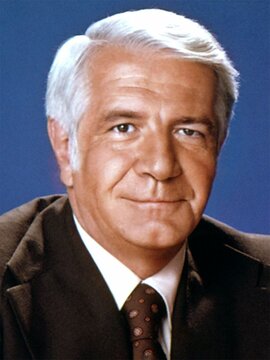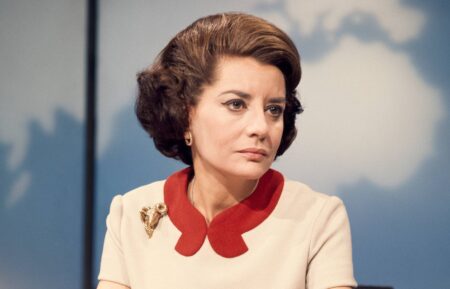Harry Reasoner

Journalist
Birth Date: April 17, 1923
Death Date: August 6, 1991
Birth Place: Dakota City, Iowa
Walter Cronkite was the undisputed king of network news coverage, but Iowa native Harry Reasoner possessed a degree of charisma and expertise that consistently placed him a close second in polls with viewers. Like many television newsmen from the early years of the medium, he had his start in print and on radio before gradually working his way up to the position of correspondent on CBS, the network where he stayed for the majority of his career. Reasoner spent more than 35 years in the TV news profession and was widely respected on several fronts. As a host, he was personable enough to seem genuine and was clearly intelligent enough to be trustworthy. However, he was also able to impart an important Everyman perspective and sensibility to his coverage that helped make it relevant and vital to all areas of the country. He was also capable of writing reports that delivered facts in an erudite manner that remained easily digestible. As one of the founders of "60 Minutes" (CBS, 1968- ), Reasoner carried over to that program the qualities he had gained on earlier duties for the network. When ABC offered him the coveted co-anchor spot on its nightly newscast, he proved more than up to the task. Winner of numerous awards during his career, including four Emmys, Reasoner embodied the finest attributes of his profession and was one of the most prominent and respected television journalists of the 20th century.
A native of Dakota City, IA, Harry Reasoner was born on April 17, 1923, but beginning in 1934, his formative years were spent in Minneapolis. Both of his parents had a background in education and Reasoner's achievements in high school gave him the grades and discipline to excel in the world of higher education. He was hired at the Minneapolis Times as a reporter before taking journalism courses, first at Stanford, and later at the University of Minnesota. Chosen in the wartime draft, Reasoner served in the army during the latter portion of World War II, but continued with his writing and won an essay contest put on by the Republican Party. Upon completing his military duties, he rejoined the staff at the Times, where he served primarily as the paper's drama critic. He also penned his first novel, Tell Me About Women (1946), which told of a soldier trying to adjust to life after returning from overseas. The following year, Reasoner married his first wife, Kathleen Carroll, and eventually took his career to radio, working as a news copy writer for a CBS station.That career direction was temporarily abandoned when Reasoner was hired by the United States Information Agency and stationed overseas. By the time he once again returned to Minneapolis, television was establishing itself as a new and important source of information. Reasoner first gained experience with a local TV station and then joined the television arm of CBS in 1956. Within five years, he was chosen to co-host "Calendar" (CBS, 1961-63), a half hour news and entertainment program that ran on weekday mornings. He also appeared in episodes of two of the network's news documentary programs, "Eyewitness to History" (CBS, 1960-63) and "CBS Reports" (CBS, 1959- ). From the time he spent in those positions, Reasoner developed a special knack for reading copy in a way that was both informal and influential, an ideal combination that put viewers at ease and educated them at the same time. He also occasionally came off as a bit brusque, though usually in a manner that communicated passion for the story at hand, rather than impatience or insouciance.
The quality of Reasoner's reporting and his ability to carry himself on camera did not go unnoticed and he became a valued contributor to other programs, hosting the Sunday evening news broadcast from 1963 onward and becoming the network's White House correspondent in 1965. The next year, he penned his first non-fiction book, The Reasoner Report, and went on to win the George Foster Peabody Award for Outstanding Contributions to Television News. Many of his pieces drew considerable praise, though a few were not as well informed and did not stand the test of time. One in particular, "The Hippie Temptation" (1967), in which Reasoner profiled counter culture youth in the Haight-Ashbury district, perpetuated a lot of myths about hippies and the effects of drugs. The program later developed a sizeable cult following because of its wrongheaded approach and inadvertent camp value.In 1968, Reasoner was one of the co-founders of "60 Minutes" (CBS, 1968- ), which went on to become the most influential and enduring news program in television history. Co-hosting with Mike Wallace, Reasoner acted as a correspondent for the first two seasons, but after 14 years with the network, he jumped ship to serve as co-anchor of "ABC World News Tonight" (ABC, 1953- ) with Howard K. Smith. Reasoner had long sought to have his own broadcast, something that would not happen at CBS with his esteemed colleague Walter Cronkite - for whom Reasoner had substituted on several occasions - firmly in place. In addition to his new duties at ABC, he also hosted a TV incarnation of "The Reasoner Report" (ABC, 1973-75), but while the show bore his name, Reasoner's contributions were sometimes minimal. That said, the laidback style perceived by some of Reasoner's co-workers did not accurately reflect his work ethic. Busy seemingly at all times, he continued his post on the nightly news, while also hosting a daily radio program.
In 1974, Reasoner was presented with the Emmy Award for Outstanding Television News Broadcaster, and the following year, ABC gave him the solo anchor spot on the nightly news program. While he did not challenge the ratings CBS enjoyed with Cronkite, the assets Reasoner brought to his previous role as a correspondent were a perfect fit for him in his new post and he provided ABC - still a consistent dead last amongst the three main networks - with a valuable aura of class and respectability. However, to his considerable chagrin, Reasoner eventually found himself having to share the desk. There had never been a female anchorperson on a network news program when ABC announced in 1976 that Barbara Walters would co-host the network's evening broadcast. An admitted chauvinist, Reasoner was against the move from the start and was so upfront in his dislike of Walters and the new hosting situation, a feud developed between the two that garnered national attention. According to Walters, their relationship devolved to the point where Reasoner demanded that any piece he read be at least as long - to the second - as anything given to Walters. In later years, Reasoner stated that he did not blame Walters for the situation and it was speculated that behind-the-scenes problems in his professional and personal life were a factor in the partnership failing.
Whatever the case, Reasoner departed ABC in 1978 and rejoined the "60 Minutes" team at CBS. It had taken "60 Minutes" a few years to develop an audience, but by the late 1970s, it was solidly established with critics and viewers in its Sunday evening timeslot. Reasoner's well-considered and researched pieces were an obvious asset to the program, as was his extensive experience in front of the camera and dependably dry wit, which further endeared him to viewers. He revived "The Reasoner Report" for CBS radio in 1979 and published his autobiography, When the Colors Fade, in 1981. However, that same year, he ended his marriage to Carroll, which had produced five daughters and two sons over the course of their 34 years together.
Reasoner was content to remain part of the highly respected team at "60 Minutes," winning additional Emmys in 1981 and 1983, but as he entered his mid-sixties, health issues began to take a toll on the veteran newsman. A longtime smoker, Reasoner underwent an operation for lung cancer in 1987 and then a second one in 1989; neither procedure convinced him to kick the habit. Eventually feeling he was no longer able to keep up with the demands of his job, Reasoner left "60 Minutes" in May of 1991 with the announcement that he would make occasional appearances as an "editor emeritus." Unfortunately, only a few weeks after he began his semi-retirement, Reasoner experienced a fall in his home. A blood clot formed on his brain that required surgery and he developed a case of pneumonia. Reasoner died on Aug. 6, 1991, survived by his second wife, insurance executive Lois Weber, whom he had wed late in life, and the children from his previous marriage.
By John Charles


